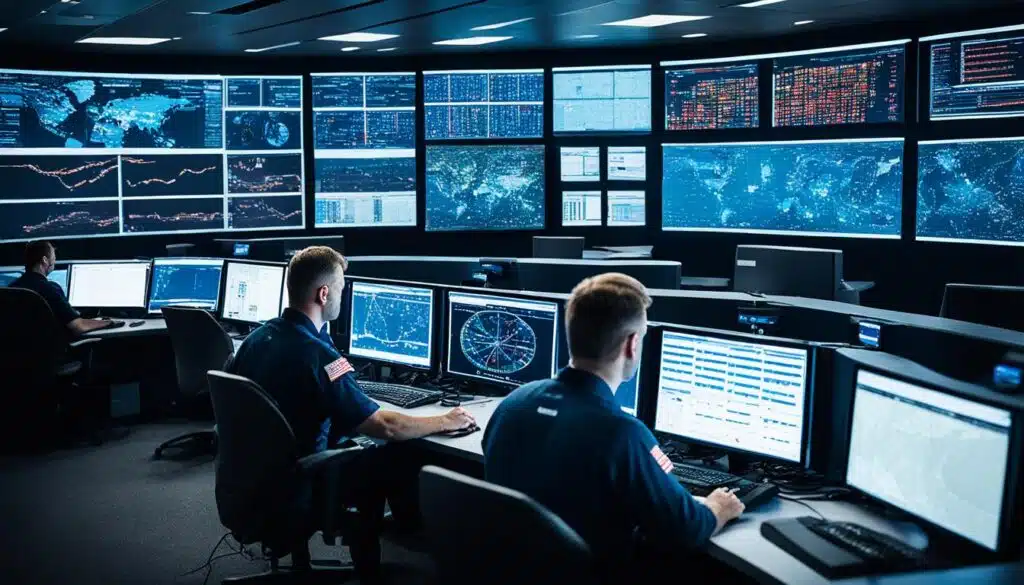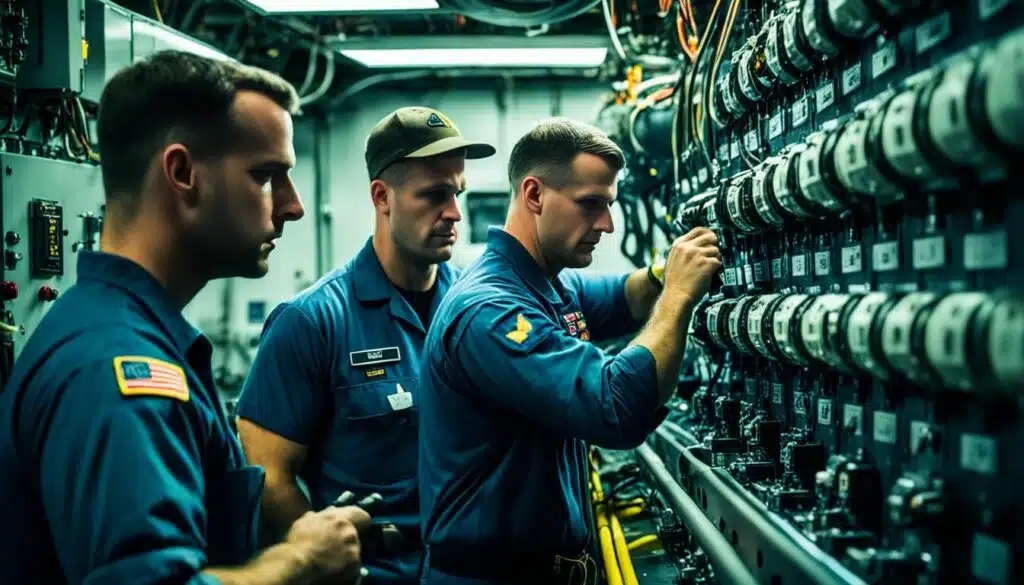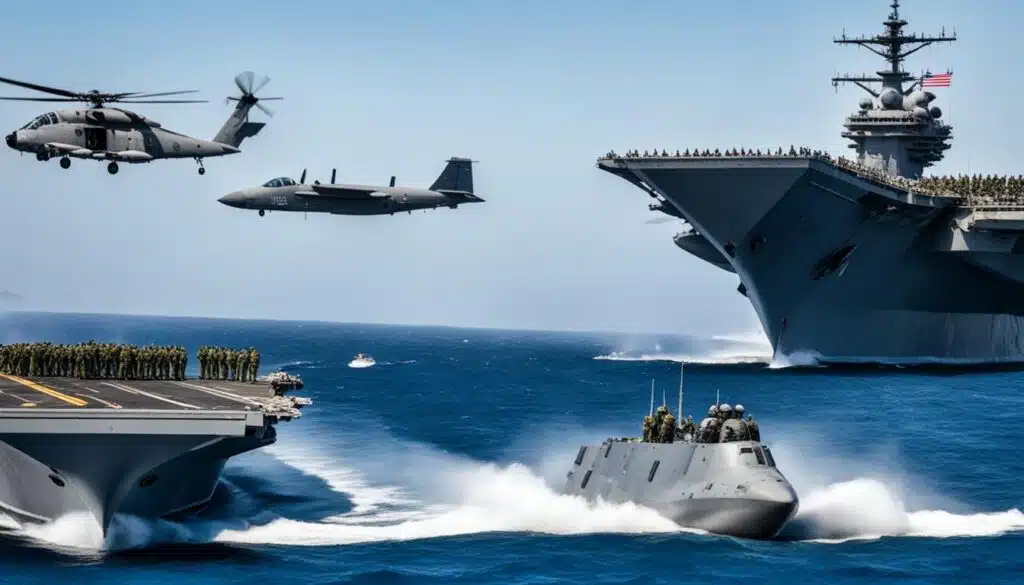Table of Contents
ToggleNavy Job : Are you looking for a rewarding career that offers diverse job options, rapid promotions, and unmatched benefits? Look no further than the United States Navy! The Navy provides a wide range of exciting job opportunities for individuals interested in a career in the military. Whether you are interested in aviation, healthcare, intelligence, or any other field, the Navy has something for you.
When you join the Navy, you’ll receive world-class training that will prepare you for the challenges and opportunities that lie ahead. From specialized mechanics to intelligence gathering, the Navy offers a variety of positions that cater to different interests and aspirations. Not only will you have the chance to serve your country, but you’ll also have access to post-service opportunities that can set you on a path to success.
One of the many benefits of joining the Navy is the generous enlistment bonuses. Enlistees can earn bonuses of up to $40,000, depending on the chosen job. These bonuses can provide a great starting point for your future and help you achieve your goals.
So why wait? Explore the exciting career options that the Navy has to offer. From naval careers to military job openings, the Navy has a job that suits your skills and interests. Take advantage of the opportunities available in the United States Navy and embark on a fulfilling career that offers rapid promotions, world-class training, and unmatched benefits.
Key Takeaways: Navy Job
- The United States Navy offers diverse job options for individuals interested in a career in the military.
- Navy sailors receive world-class training and have access to post-service opportunities.
- Enlistment bonuses of up to $40,000 are available for certain Navy jobs.
- Explore the exciting career options available and take advantage of the rapid promotions and unmatched benefits that the Navy offers.
Sought-After Navy Jobs
If you have a passion for aircraft maintenance and specialized mechanics, then a career as an Aviation Machinist’s Mate (AD) in the Navy may be the perfect fit for you. ADs play a critical role in maintaining, servicing, and repairing advanced aircraft. They are highly skilled and trained to handle complex engine, fuel, and lubrication systems.
As an AD, you will have the opportunity to specialize in specific areas and gain expertise in aircraft maintenance. This specialization can lead to highly sought-after civilian certifications, opening up even more job prospects after your service in the Navy. The skills and knowledge you acquire as an AD can make you a valuable asset in the aviation industry.
Another exciting perk of pursuing a career as an Aviation Machinist’s Mate is the opportunity to receive bonuses of up to $20,000. These financial incentives can provide a great start to your career and serve as a reward for your dedication and hard work.
Benefits of becoming an Aviation Machinist’s Mate:
- Hands-on experience with advanced aircraft maintenance
- Specialization opportunities in specific areas
- Eligibility for highly sought-after civilian certifications
- Post-service job prospects in the aviation industry
- Bonuses of up to $20,000
Start your journey as an Aviation Machinist’s Mate and be a part of a highly skilled team dedicated to maintaining the Navy’s advanced aircraft. Your expertise and contributions will be invaluable to the success of naval operations.
“Being an Aviation Machinist’s Mate has given me the opportunity to work on some of the most advanced aircraft in the world. It’s a challenging and rewarding career that has opened doors for me in the aviation industry.” – Mark Davis, Aviation Machinist’s Mate
Cryptologic Technicians in the Navy

Cryptologic technicians (CTs) play a crucial role in intelligence gathering and information warfare in the Navy. As CTs, they are responsible for analyzing and interpreting intelligence data, collecting and deciphering foreign communications, and protecting Navy information from cyber attacks.
Working in this field requires high-security clearances due to the sensitive nature of the information handled. CTs undergo extensive training to develop the necessary skills in cryptography, computer systems, and network analysis to excel in their role.
In addition to their intelligence duties, CTs also contribute to the Navy’s overall mission of safeguarding national security. They collaborate with other military branches and government agencies to provide critical intelligence support, enabling informed decision-making at the highest levels.
“As a CT, you have the opportunity to make a tangible impact on national security by uncovering hidden threats and protecting vital information.”
Enlisting as a CT in the Navy comes with various benefits, including enlistment bonuses of up to $35,000. This financial incentive rewards individuals for choosing this important and challenging career path.
CT Job Responsibilities:
- Analyzing and interpreting intelligence data
- Collecting and deciphering foreign communications
- Protecting Navy information from cyber attacks
- Collaborating with other military branches and government agencies
CT Enlistment Bonuses:
Enlistees in the CT field can receive bonuses of up to $35,000, incentivizing individuals to join the Navy in this critical role.
CT Career Opportunities:
Career advancement for CTs includes opportunities for specialization and higher-level positions within the intelligence field. CTs can also pursue civilian careers in intelligence and cybersecurity after their service, leveraging their high-security clearances and valuable experience.
With the increasing importance of information warfare in modern conflicts, the demand for skilled CTs continues to grow. The Navy provides comprehensive training and support to its CTs, ensuring they are equipped with the necessary skills to succeed in this challenging and rewarding career.
| Benefits of Being a CT in the Navy | Enlistment Bonuses | CT Career Opportunities |
|---|---|---|
| Highly valued role in intelligence gathering and information warfare | Up to $35,000 | Specializations within the intelligence field |
| Opportunity to contribute to national security | Civilian careers in intelligence and cybersecurity | |
| Extensive training in cryptography and computer systems | Advancement to higher-level positions |
Join the Navy as a Cryptologic Technician
If you have a passion for intelligence analysis, cybersecurity, and protecting vital information, a career as a CT in the Navy could be the perfect fit for you. Take the first step towards an exciting and meaningful career by exploring the opportunities available in the Navy today.
Intelligence Specialists in the Navy

Intelligence specialists (IS) play a vital role in the Navy’s Information Dominance Corps. These highly skilled professionals are responsible for analyzing and breaking down raw data to provide relevant and actionable intelligence for decision-making.
IS jobs in the Navy involve highly classified work, requiring individuals with strong analytical skills and a keen eye for detail. These specialists utilize advanced technology and techniques to gather, analyze, and interpret data, ensuring that critical information is available to support military operations and national security.
Enlisting as an intelligence specialist in the Navy offers not only the opportunity to serve on the forefront of information warfare but also the chance to receive enlistment bonuses of up to $10,000. This serves as a valuable incentive to attract qualified individuals who are dedicated to protecting our nation.
Skills Required:
- Analytical Skills: Intelligence specialists must possess strong analytical abilities to effectively evaluate information and identify patterns or trends.
- Attention to Detail: Given the nature of classified work, attention to detail is crucial for intelligence specialists to ensure accuracy and precision in their analysis.
- Problem-Solving: The ability to think critically and solve complex problems quickly is essential in the fast-paced environment of intelligence work.
- Communication: Intelligence specialists must be able to communicate information effectively, both verbally and in written reports.
- Collaboration: Working as part of a team is common in the Navy, and intelligence specialists need to collaborate with other professionals to gather and analyze information effectively.
Intelligence specialists in the Navy are the backbone of the Information Dominance Corps, providing critical intelligence that informs decision-making and ensures mission success.
To illustrate the significance of intelligence work in the Navy, consider the following example:
| Example | Impact of Intelligence Work |
|---|---|
| An intelligence specialist intercepts and analyzes coded enemy communications, uncovering vital information about an impending attack. This intelligence is swiftly relayed to decision-makers, enabling them to take proactive measures, thwart the threat, and save lives. |
As demonstrated in the example, the work of intelligence specialists directly contributes to the safety and success of military operations. Their contributions help keep our nation secure by providing valuable insights into the plans and intentions of potential adversaries.
With a focus on information dominance, intelligence specialists in the Navy provide a critical edge in the ever-evolving landscape of national security.
Hospital Corpsmen in the Navy

Hospital corpsmen (HMs) are vital members of the United States Navy’s healthcare team. They play a crucial role in providing essential medical care and treatment to sailors and marines, ensuring their physical well-being on and off the battlefield.
As HM training is comprehensive and diverse, corpsmen acquire a wide range of medical skills and knowledge. From surgery and radiology to physical therapy and emergency care, they are equipped to handle various medical scenarios with utmost proficiency and precision.
HMs provide holistic care to service members, addressing not only their physical health but also their mental and emotional well-being. They understand the importance of the mind-body connection in achieving optimal health and are trained to approach healthcare from a holistic perspective.
Enlisting as an HM in the Navy opens up numerous opportunities for a rewarding healthcare career. Corpsmen have the chance to work alongside highly skilled medical professionals, gaining invaluable experience and expertise that can propel their future in the medical field.
Medical Training for Hospital Corpsmen
The medical training provided to hospital corpsmen in the Navy is unparalleled. They undergo rigorous education and hands-on practice to ensure they are well-prepared to handle medical emergencies, administer treatments, and provide compassionate care.
HMs receive specialized training in various medical specialties, including:
- Surgery
- Radiology
- Emergency medicine
- Pharmacy
- Physical therapy
- Mental health
This comprehensive training equips corpsmen with the skills and knowledge necessary to deliver high-quality healthcare to those in need, even in challenging and demanding environments.
Enlistment Bonuses for Hospital Corpsmen
One of the many advantages of enlisting as a hospital corpsman in the Navy is the opportunity to receive enlistment bonuses. These bonuses serve as incentives for individuals considering a healthcare career in the military and can provide a financial boost.
Qualified hospital corpsmen can receive enlistment bonuses of up to $20,000. This financial reward recognizes the specialized skills and dedication required for the role. It also serves as a testament to the Navy’s commitment to attracting top medical talent to its ranks.
“Hospital corpsmen are the backbone of the Navy’s medical operations. Their dedication and expertise ensure the well-being of our servicemen and women, both in times of peace and during deployments.”
– Admiral John Richardson
By becoming a hospital corpsman in the Navy, individuals have the opportunity to make a significant impact on the lives of their fellow service members. From providing critical medical care on the frontlines to being a source of comfort and support, corpsmen play an indispensable role in keeping the Navy’s personnel healthy and mission-ready.
Explosive Ordnance Disposal Technicians

Explosive ordnance disposal technicians (EOD) in the Navy have a critical role in safely disarming and disposing of various types of ordnance, including conventional and chemical explosives. These highly skilled technicians undergo rigorous training and collaborate closely with special ops and special warfare units, making them an integral part of the Navy’s mission to protect national security.
EOD technicians are responsible for identifying, assessing, and neutralizing explosive hazards in various environments, including land, air, and water. Their expertise and quick thinking enable them to handle life-threatening situations calmly and efficiently. With precision and expertise, they render explosives safe, ensuring the safety of personnel and civilians.
In addition to their bomb disposal duties, EOD technicians may also be called upon to support high-profile events and work alongside federal law enforcement agencies, including the Secret Service. Their knowledge and skills in explosive handling and disposal make them an invaluable asset in protecting public safety.
EOD technicians must possess exceptional physical fitness and mental agility to perform their demanding tasks effectively. The physically demanding nature of the job requires them to maintain a high level of physical fitness and stamina. This ensures they can perform physically demanding tasks while wearing specialized protective gear and equipment.
Attracting and retaining top-tier professionals in this field is vital, and the Navy offers competitive bonuses of $37,000 to enlistees who specialize as EOD technicians. These bonuses serve as incentives to join this elite group and recognize the significant role they play in safeguarding our nation.
Aviation Rescue Swimmers in the Navy

Aviation rescue swimmers (AIRRs) are elite Navy personnel trained for high-risk rescue missions. Their expertise is crucial in emergency response operations, including rescuing civilians, conducting anti-submarine surveillance, and protecting American vessels. These brave individuals undergo intense physical and mental training to excel in their roles.
“As an aviation rescue swimmer, you have to be prepared for anything. Our team is always ready to respond to emergencies at a moment’s notice, whether it’s rescuing someone stranded at sea or supporting military operations. It’s a demanding job, but the rewards are immeasurable.”
The role of aviation rescue swimmers requires a high level of physical fitness, as they are often deployed in challenging and unpredictable environments. They must possess exceptional swimming and lifesaving skills, as well as the ability to perform complex water and helicopter rescues.
Enlisting as an aviation rescue swimmer offers fantastic incentives, including enlistment bonuses of up to $37,000. These bonuses serve as a token of appreciation for the commitment and dedication required for this high-risk profession.
Skills and Responsibilities of Aviation Rescue Swimmers
Aviation rescue swimmers undergo extensive training to develop a unique skill set. Their responsibilities include:
- Performing search and rescue operations in various environments
- Providing medical aid and lifesaving techniques
- Operating advanced rescue equipment and systems
- Executing helicopter and water-based rescues
- Supporting tactical and reconnaissance missions
Testimonial: A Day in the Life of an Aviation Rescue Swimmer
“As an aviation rescue swimmer, every day presents a new challenge. I’ve had the opportunity to save lives, work alongside amazing teammates, and play a vital role in protecting our nation. It’s an honor to serve as an AIRR and make a difference in people’s lives.”
– Aviation Rescue Swimmer, Petty Officer Smith
The testimonial above exemplifies the extraordinary experiences that come with being an aviation rescue swimmer in the Navy. These professionals perform critical missions that directly impact the safety and well-being of individuals, making a lasting difference in times of crisis.
Other Exciting Navy Career Options
In addition to the highlighted positions, the Navy offers a wide range of other exciting career options. These include roles in logistics, cyber & IT, creative fields, engineering, communications, and more. Whether an individual is interested in working on land, in the air, or at sea, the Navy provides diverse opportunities for a fulfilling career in various specialties.
If you have a passion for logistics, the Navy has numerous job opportunities in this field. From managing supply chains to coordinating transport operations, logistics professionals play a critical role in ensuring the smooth functioning of Navy operations.
Cyber & IT is another rapidly growing field within the Navy. With the increasing importance of cybersecurity in the modern world, the Navy offers specialized roles for professionals who are skilled in protecting sensitive information and combating cyber threats.
For the creatively inclined, the Navy offers various opportunities in fields such as graphic design, photography, and videography. These roles contribute to the Navy’s visual identity and help communicate its mission to the world.
Engineers also have a place in the Navy, with positions available in various disciplines ranging from civil engineering to electrical engineering. Navy engineers work on critical infrastructure projects and play a key role in maintaining and improving the Navy’s capabilities.
The Navy also recognizes the importance of effective communication and offers career options in public affairs and journalism. These roles involve telling the Navy’s story to the public and ensuring accurate and timely information dissemination.
| Career Options in the Navy | Description |
|---|---|
| Logistics | Managing supply chains, coordinating transport operations, and ensuring smooth functioning of Navy operations. |
| Cyber & IT | Specialized roles in cybersecurity and information technology to protect sensitive information and combat cyber threats. |
| Creative Fields | Opportunities in graphic design, photography, and videography to contribute to the Navy’s visual identity. |
| Engineering | Various engineering disciplines such as civil engineering, electrical engineering, and more to maintain and improve Navy capabilities. |
| Communications | Career options in public affairs and journalism to ensure accurate and timely information dissemination. |
Nuclear Machinist Mates in the Navy

Nuclear machinist mates in the Navy play a vital role in operating and maintaining the nuclear power generation and propulsion systems on aircraft carriers and submarines. These highly skilled individuals receive extensive training in nuclear operations to ensure the safe and efficient functioning of these critical systems. To qualify for this position, enlistees must undergo rigorous nuclear training and obtain a top-secret security clearance.
The responsibilities of nuclear machinist mates include monitoring and controlling nuclear reactors, conducting routine maintenance and repairs, and troubleshooting any issues that arise. They work closely with a team of experts to ensure the power generation systems are operating at peak performance to support military operations.
Due to the nature of their work, nuclear machinist mates must possess a high level of technical proficiency and attention to detail. The Navy provides comprehensive training programs to equip them with the necessary knowledge and skills needed for their demanding roles.
Enlistees in this job can also benefit from competitive bonuses of up to $100,000. These bonuses serve as incentives to attract and retain talented individuals who are willing to take on the unique challenges and responsibilities associated with nuclear operations.
Training and Qualifications
The training for nuclear machinist mates is rigorous and comprehensive. It involves both classroom instruction and hands-on experience to ensure a thorough understanding of nuclear power generation systems. Enlistees undergo specialized training at Nuclear Power Training Units (NPTUs) where they learn the principles of nuclear physics, reactor operations, radiological controls, and more.
Upon completion of their initial training, nuclear machinist mates continue to receive ongoing education and training throughout their careers to stay updated on the latest advancements in nuclear technology and safety protocols.
To obtain a top-secret security clearance, applicants must undergo a thorough background investigation to assess their reliability, trustworthiness, and loyalty to the United States. This clearance is necessary to work with classified information and to ensure the security of the nuclear power systems.
The dedication, attention to detail, and advanced technical skills required of nuclear machinist mates make them invaluable assets to the Navy’s mission of national defense.
Key Takeaways:
- Nuclear machinist mates play a crucial role in operating and maintaining nuclear power generation systems on Navy vessels.
- Extensive training in nuclear operations is provided to ensure the safe and efficient functioning of these systems.
- Enlistees must obtain a top-secret security clearance due to the sensitive nature of their work.
- Competitive bonuses of up to $100,000 are available to individuals in this job.
Benefits of Becoming a Nuclear Machinist Mate
| Benefits | Description |
|---|---|
| Competitive Bonuses | Nuclear machinist mates can receive bonuses of up to $100,000. |
| Advanced Training | Enlistees undergo extensive training in nuclear operations and technologies. |
| High-Security Clearance | Nuclear machinist mates must obtain a top-secret security clearance. |
| Career Opportunities | Skills gained as a nuclear machinist mate can lead to diverse post-service career options. |
Navy Air Traffic Controllers

Navy air traffic controllers play a crucial role in ensuring the safe operation of aircraft at airfields and aircraft carriers. They are responsible for managing the flow of air traffic, ensuring that planes take off, land, and maneuver safely. Through their expertise in flight safety and radar operations, they provide critical information to pilots and monitor aircraft movements to prevent collisions and maintain orderly operations.
These highly trained professionals interpret radar data, analyze weather conditions, and maintain aeronautical charts. They coordinate with pilots, providing essential guidance and instructions for takeoff, landing, and flight paths. Their meticulous attention to detail and quick decision-making capabilities are essential for ensuring smooth and efficient air traffic operations, even in high-pressure situations.
The skills gained as a Navy air traffic controller are transferable to civilian air traffic control careers. Civilian job titles in this field include air traffic controller, airfield operations specialist, and flight service specialist. The training and experience acquired in the Navy provide a solid foundation in aviation and air traffic management that is highly valued in the civilian sector.
Furthermore, the Navy offers transferable credit hours for the training received as an air traffic controller. These credits can be applied towards a degree, allowing Navy personnel to continue their education while serving their country. This unique opportunity to earn college credit while gaining valuable work experience sets Navy air traffic controllers apart in the job market.
Benefits of a Career as a Navy Air Traffic Controller:
- Flight Safety: Navy air traffic controllers play a vital role in maintaining the safety of aircraft, ensuring smooth operations and preventing potential accidents.
- Radar Operations: They possess expertise in radar systems, interpreting and analyzing data to facilitate efficient air traffic management.
- Career Transition: The skills and experience gained in the Navy can be directly translated to civilian air traffic control careers, providing a seamless transition to a rewarding profession.
- Transferable Credit Hours: Training as a Navy air traffic controller earns transferable credit hours towards a degree, allowing for educational advancement while serving in the military.
Choosing a career as a Navy air traffic controller not only offers a chance to serve one’s country and contribute to flight safety but also provides a strong foundation for a future in civilian air traffic control. The skills, training, and transferable credit hours gained in this role create numerous opportunities for professional growth and a fulfilling career in the field of aviation.
The Navy’s Most Popular Jobs

When it comes to popular Navy jobs, several positions stand out based on StrawPoll’s rankings. These rankings take into account factors such as job demand, job satisfaction, and the unique skills required for each role. Let’s take a closer look at some of the most sought-after careers in the Navy:
Navy SEALs
The Navy SEALs are an elite special operations force known for their rigorous training and high-stakes missions. These highly trained warriors operate on land, sea, and air, executing critical missions that require exceptional physical and mental conditioning.
Intelligence Officers
Navy intelligence officers play a crucial role in gathering and analyzing information to support national security efforts. With a focus on intelligence gathering and analysis, these officers work to identify potential threats and formulate effective strategies to protect our country.
Aviation Mechanics
Aviation mechanics in the Navy are responsible for ensuring the proper maintenance and operation of advanced aircraft. From troubleshooting complex mechanical issues to executing precise repairs, these skilled technicians play a vital role in ensuring the safety and effectiveness of Naval aviation.
Hospital Corpsmen
Hospital corpsmen provide essential medical care and support to Navy personnel. These dedicated healthcare professionals receive comprehensive training in various specialties, including emergency medicine, surgery, and preventive care. They play a critical role in maintaining the health and well-being of Navy personnel.
Cryptologic Technicians
Cryptologic technicians employ advanced technology and specialized skills to gather and interpret intelligence for Navy operations. Working in the fields of information warfare and cybersecurity, these professionals ensure the security of sensitive information and aid in the prevention of cyber threats.
These are just a few examples of the popular Navy jobs that attract individuals seeking challenging and fulfilling careers. Each of these positions offers unique opportunities for personal and professional growth within the United States Navy.
| Rank | Job Title |
|---|---|
| 1 | Navy SEALs |
| 2 | Intelligence Officers |
| 3 | Aviation Mechanics |
| 4 | Hospital Corpsmen |
| 5 | Cryptologic Technicians |
Also Read : How To Follow Up On A Job Application
Conclusion
The Navy offers a multitude of Navy job opportunities that can lead to fulfilling careers with unmatched benefits, rapid promotions, and diverse positions. Whether you’re interested in aviation, healthcare, intelligence, or other fields, the Navy provides a wide range of options to choose from.
By serving in the Navy, individuals have the chance to contribute to national security while enjoying a rewarding and satisfying career. The Navy’s commitment to excellence is exemplified through world-class training, access to advanced technology, and the opportunity to work alongside skilled professionals.
Moreover, the Navy offers unparalleled benefits, including healthcare coverage, retirement plans, and educational opportunities. Rapid promotions based on merit and dedication ensure career growth and advancement within the organization.
With Navy job opportunities being diverse and constantly evolving, there’s a position for everyone. From specialized technical roles to leadership positions, the Navy provides a platform for individuals to excel and make a lasting impact.
FAQs
What is the United States Navy?
The United States Navy is the naval warfare service branch of the United States Armed Forces. It is one of the seven uniformed services of the United States and is under the purview of the Department of the Navy, headed by the Secretary of the Navy.
What does the Department of the Navy encompass?
The Department of the Navy includes both the United States Navy and the United States Marine Corps, each with distinct roles and missions within the overall national defense structure.
What is the significance of the jump to content Department of the Navy?
The ‘Jump to Content Department of the Navy’ feature provides quick access to relevant information within the Navy or Marine Corps official website, allowing users to navigate directly to specific sections or resources.
How can one join the Navy?
To join the Navy, individuals must meet the entry requirements, pass the necessary assessments and examinations, and complete the designated training programs. Prospective recruits can find detailed information on the official Navy recruitment website.
What are some key units within the US Navy?
The US Navy comprises various units, including carrier strike groups, submarine squadrons, naval aviation wings, amphibious task forces, and naval special warfare commands, each specializing in specific missions and capabilities.
What is the role of a Navy officer?
A Navy officer is a commissioned officer responsible for commanding naval vessels, leading troops, and overseeing various operational aspects within the Navy. Officers undergo specialized training and are critical to the leadership and management of naval forces.
What is the chain of command within the Navy?
The chain of command in the Navy establishes the hierarchical structure through which orders are communicated and executed. It typically extends from the Chief of Naval Operations to various unit commanders, ensuring clear lines of authority and accountability.





